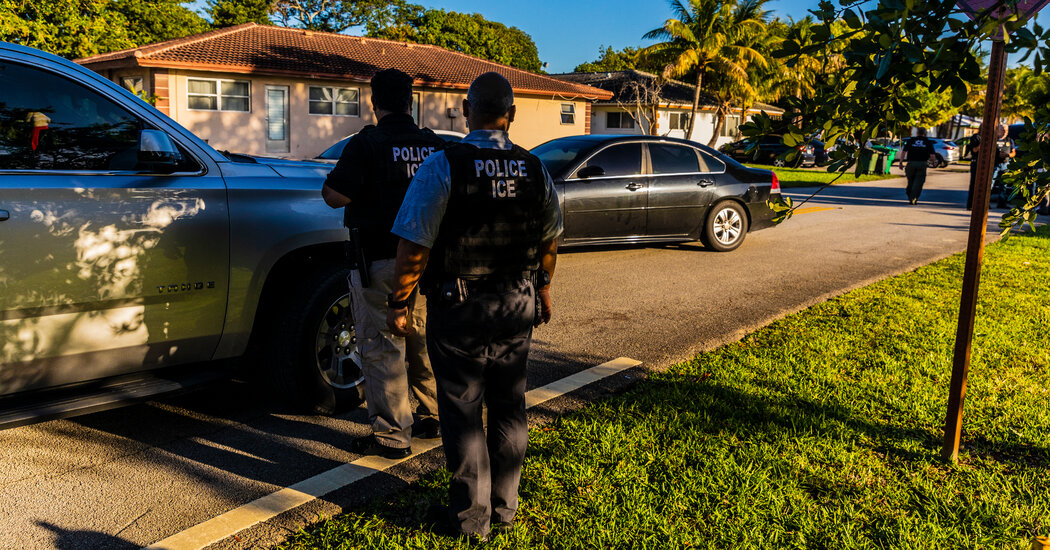The House on Wednesday gave final approval to a bill that would require the detention and deportation of migrants who enter the country without authorization and are charged with certain crimes, making it the first bill to clear the new Congress and head to President Trump’s desk for his signature.
The final vote, 263 to 156, capped the opening salvo in a broader Trump-era crackdown on immigration and undocumented migrants that the president has promised, Republicans have championed, and a small but increasing group of Democrats has begun to embrace. Forty-six House Democrats joined all Republicans in backing it, a sign of the growing cross-party consensus around taking a harder line against those who enter the country illegally.
The bill is all but certain to be quickly signed by Mr. Trump, who on Monday started his second term by issuing a raft of executive orders that kicked off his immigration crackdown, clamping down on both legal and illegal entries into the United States.
Wednesday’s measure, titled the Laken Riley Act, is named for a 22-year-old Georgia nursing student who was killed last year by a migrant from Venezuela who crossed into the United States illegally. The man had previously been arrested in a shoplifting case but had not been detained.
The House gave its blessing after the Senate spent last week debating changes to the bill, exposing deep divisions among Democrats over immigration. Some Democrats have moved to the right on the issue after their party’s electoral losses in November, arguing that they must embrace basic steps to punish unlawfulness, even if they disagree with some of the details. But others pushed back forcefully on the bill, saying it would deprive accused criminals of due process, a fundamental principle of the criminal justice system, and was aimed mostly at demonizing unauthorized immigrants.
The act instructs federal officials to detain unauthorized immigrants arrested for or charged with burglary, theft, larceny, shoplifting, assaulting a police officer, or crimes that result in death or serious bodily injury, expanding the list of charges that would subject migrants to immediate detention and potential deportation.
The bill would also give state attorneys general the right to sue the U.S. attorney general or the homeland security secretary if an immigrant who entered the country illegally went on to commit a crime that harms the state or any of its residents. (Immigration advocates have denounced the provision as a covert attempt to let conservative governors and state attorneys general dictate federal migrant detention policies.)
Republicans teed up the measure as the first of several border bills they hope to revive and enact now that they have cemented their governing trifecta. A similar measure passed the House last year but died when the Democratic-led Senate declined to take it up.
The G.O.P. also wants to resurrect measures to increase deportations, hold asylum seekers outside the United States and strip federal funding from cities that restrict their cooperation with federal immigration enforcement agencies.
“I vowed I would fight with every ounce I had to make sure that we protected families across this country, and that we did,” said Representative Mike Collins of Georgia, a Republican who wrote the bill and whose district includes Ms. Riley’s hometown, Athens. “There’s nothing with any meaningful legislation that happens in this town up here until the American people demand it, and by God, they’re demanding that this get passed and we get these criminals out of our country.”
The bill’s swift journey through Congress this month laid bare fissures among Democrats about how to position themselves on immigration, and foreshadowed the immense challenge of maintaining unity on a pressing topic that Mr. Trump has made his signature issue.
“It is so shameful that the first bill of the new Congress will put a target on the back of millions, millions of our neighbors,” Representative Rashida Tlaib, Democrat of Michigan, said in a floor speech against the measure.
Some Democrats, including Senators Michael Bennet of Colorado and Patty Murray of Washington, raised grave concerns about the bill, arguing that it would undermine due process rights for migrants who had not yet been convicted of crimes. They also said that it would waste limited resources that federal immigration enforcement agencies could use to apprehend people who have committed more serious, violent offenses.
Others, including Representative Greg Casar of Texas, who chairs the Congressional Progressive Caucus, said the party needs to clearly articulate to voters what’s actually in the bills that Republicans are forcing them to vote on, and unite in opposition.
“These bills that the Republicans are throwing our way are so extreme that we should be able to get united Democratic opposition, but for the enormous amount of lies that are being pumped out by the president of the United States,” Mr. Casar told reporters Wednesday afternoon before the vote. “Trump campaigned on the lie that immigrants are the source of the nation’s problems. We have to combat the flood of lies.”
Some House Democrats on Wednesday called their Republican colleagues hypocritical for supporting the bill, which would deport migrants based on a mere accusation of assaulting a police officer, immediately after applauding Mr. Trump’s pardons for nearly 1,600 convicted Jan. 6 rioters, including several convicted of attacking police officers.
“I have been clear that violent criminals have no place in our society, and with President Trump’s anti-law enforcement pardons of violent criminals, I felt it was important to stand with law enforcement,” said Representative Eugene Vindman, a first-term Democrat of Virginia, who opposed the bill when it came up in the House earlier this month but voted yes on Wednesday.
Mr. Vindman said language added by the Senate to include violent crime and assault of a police officer as detainable offenses were enough to persuade him to switch, even though he had concerns about the lack of due process in the bill and its potential cost.
“I voted yes on this bill to uphold the rule of law, keep our communities safe from violent crime, and reinforce that any assault against a police officer is abhorrent,” Mr. Vindman said.





